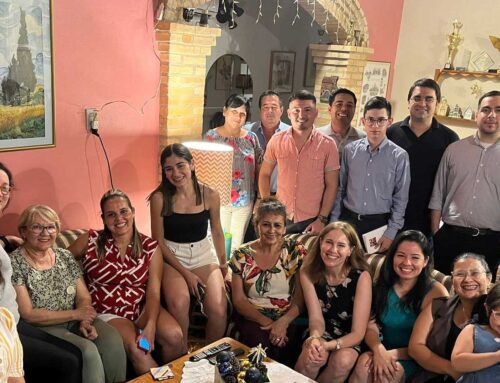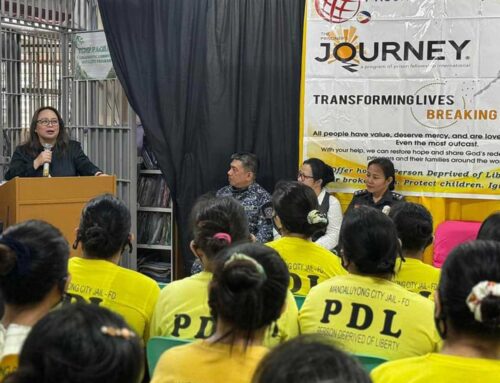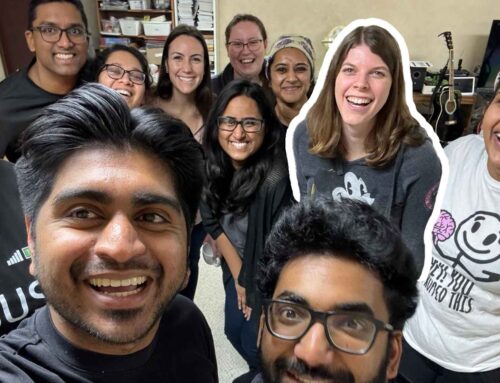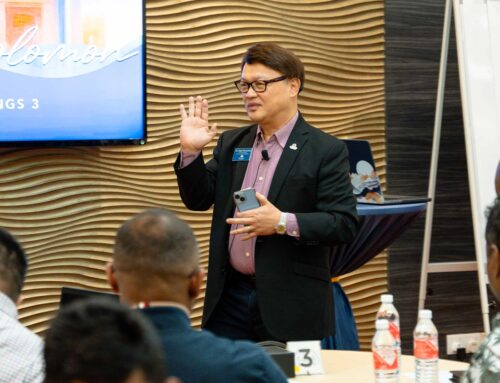A New Season for the Gospel in Japan
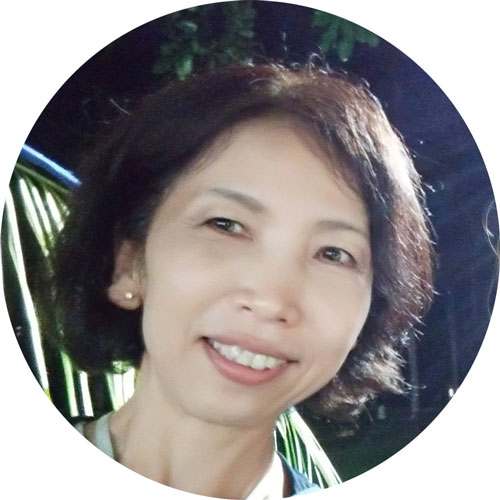 Why does the Haggai model place so much importance on local leaders?
Why does the Haggai model place so much importance on local leaders?
It is because no two people, no two communities, and no two countries are the same. There are historical, cultural, and social distinctions that make every locale unique, and understanding those distinctions is key to sharing Gospel in a way that will resonate.
In Japan, less than 2% of the population identifies as Christian, and there is significant cultural resistance to a faith that is characterized as “Western.” This has made establishing a local Haggai network incredibly difficult. Since 1972, when the first Japanese Haggai leader was equipped, only an average of five new local Japanese leaders were equipped each year. But recently, a small group of Haggai leaders has relaunched Haggai Japan, and with it, the country’s second Haggai national seminar.
Japan is a strategic location. It is the 11th largest country in the world by population and, depending upon the method of measurement, has the third or fourth-largest economy.
In preparation for the large undertaking of a country-wide seminar, the leadership of Haggai Japan held several mini-sessions, gaining comfort with the virtual learning tools and refining program content. These 90-minute mini-seminars brought awareness of Haggai International to a new audience of believers in Japan. What began with only 13 participants in July 2020 grew to 33 participants in these mini sessions by October of that year.
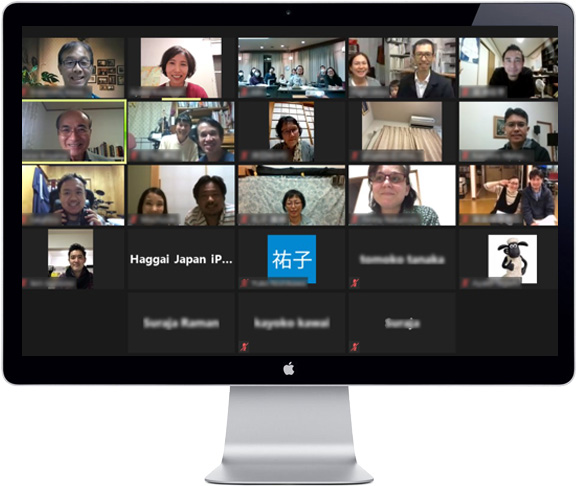
By 2021, after this virtual trial, they were ready to take the program nationwide.
A seminar spanning five months launched in the spring with 16 sessions that were two and a half hours each. Haggai leader Ayako Kawasaki explained that the long, incremental format was specifically developed to accommodate the traditionally heavy workweeks of Japanese professionals.
“Long term fits the Japanese schedule. It would have been impossible for them to leave their work earlier too often. Sessions twice or three times in the week would be difficult because they normally have to work until late in the evening.”
The seminar was also ground-breaking in that it offered in-depth Christian leadership content fully spoken and written in Japanese.
“The participants had admired Haggai International, yet they had hesitated to join because of the language barrier. A Haggai seminar, held in Japanese, was welcome news for them.”
Participants were able to cultivate strong relationships that encouraged them to feel more reassured and active amongst each other when engaging in discussion. These long terms also enabled the opportunity for participants to attend when accessible for them during their daily lives, where they could apply what they learned from the national seminar in their workplaces and communities.
With the conclusion of the seminar in July, 14 new leaders have now been equipped through Haggai Japan. And though the number may be comparatively modest, Ayako leans on the biblical principle that has guided the project from its inception.
“If we do larger things than God assigned, we fail or are exhausted. However, if we do small things faithfully, God will guide us along step by step, to the major projects.”
A New Season for the Gospel in Japan
 Why does the Haggai model place so much importance on local leaders?
Why does the Haggai model place so much importance on local leaders?
It is because no two people, no two communities, and no two countries are the same. There are historical, cultural, and social distinctions that make every locale unique, and understanding those distinctions is key to sharing Gospel in a way that will resonate.
In Japan, less than 2% of the population identifies as Christian, and there is significant cultural resistance to a faith that is characterized as “Western.” This has made establishing a local Haggai network incredibly difficult. Since 1972, when the first Japanese Haggai leader was equipped, only an average of five new local Japanese leaders were equipped each year. But recently, a small group of Haggai leaders has relaunched Haggai Japan, and with it, the country’s second Haggai national seminar.
Japan is a strategic location. It is the 11th largest country in the world by population and, depending upon the method of measurement, has the third or fourth-largest economy.
In preparation for the large undertaking of a country-wide seminar, the leadership of Haggai Japan held several mini-sessions, gaining comfort with the virtual learning tools and refining program content. These 90-minute mini-seminars brought awareness of Haggai International to a new audience of believers in Japan. What began with only 13 participants in July 2020 grew to 33 participants in these mini sessions by October of that year.

By 2021, after this virtual trial, they were ready to take the program nationwide.
A seminar spanning five months launched in the spring with 16 sessions that were two and a half hours each. Haggai leader Ayako Kawasaki explained that the long, incremental format was specifically developed to accommodate the traditionally heavy workweeks of Japanese professionals.
“Long term fits the Japanese schedule. It would have been impossible for them to leave their work earlier too often. Sessions twice or three times in the week would be difficult because they normally have to work until late in the evening.”
The seminar was also ground-breaking in that it offered in-depth Christian leadership content fully spoken and written in Japanese.
“The participants had admired Haggai International, yet they had hesitated to join because of the language barrier. A Haggai seminar, held in Japanese, was welcome news for them.”
Participants were able to cultivate strong relationships that encouraged them to feel more reassured and active amongst each other when engaging in discussion. These long terms also enabled the opportunity for participants to attend when accessible for them during their daily lives, where they could apply what they learned from the national seminar in their workplaces and communities.
With the conclusion of the seminar in July, 14 new leaders have now been equipped through Haggai Japan. And though the number may be comparatively modest, Ayako leans on the biblical principle that has guided the project from its inception.
“If we do larger things than God assigned, we fail or are exhausted. However, if we do small things faithfully, God will guide us along step by step, to the major projects.”
A New Season for the Gospel in Japan
 Why does the Haggai model place so much importance on local leaders?
Why does the Haggai model place so much importance on local leaders?
It is because no two people, no two communities, and no two countries are the same. There are historical, cultural, and social distinctions that make every locale unique, and understanding those distinctions is key to sharing Gospel in a way that will resonate.
In Japan, less than 2% of the population identifies as Christian, and there is significant cultural resistance to a faith that is characterized as “Western.” This has made establishing a local Haggai network incredibly difficult. Since 1972, when the first Japanese Haggai leader was equipped, only an average of five new local Japanese leaders were equipped each year. But recently, a small group of Haggai leaders has relaunched Haggai Japan, and with it, the country’s second Haggai national seminar.
Japan is a strategic location. It is the 11th largest country in the world by population and, depending upon the method of measurement, has the third or fourth-largest economy.
In preparation for the large undertaking of a country-wide seminar, the leadership of Haggai Japan held several mini-sessions, gaining comfort with the virtual learning tools and refining program content. These 90-minute mini-seminars brought awareness of Haggai International to a new audience of believers in Japan. What began with only 13 participants in July 2020 grew to 33 participants in these mini sessions by October of that year.

By 2021, after this virtual trial, they were ready to take the program nationwide.
A seminar spanning five months launched in the spring with 16 sessions that were two and a half hours each. Haggai leader Ayako Kawasaki explained that the long, incremental format was specifically developed to accommodate the traditionally heavy workweeks of Japanese professionals.
“Long term fits the Japanese schedule. It would have been impossible for them to leave their work earlier too often. Sessions twice or three times in the week would be difficult because they normally have to work until late in the evening.”
The seminar was also ground-breaking in that it offered in-depth Christian leadership content fully spoken and written in Japanese.
“The participants had admired Haggai International, yet they had hesitated to join because of the language barrier. A Haggai seminar, held in Japanese, was welcome news for them.”
Participants were able to cultivate strong relationships that encouraged them to feel more reassured and active amongst each other when engaging in discussion. These long terms also enabled the opportunity for participants to attend when accessible for them during their daily lives, where they could apply what they learned from the national seminar in their workplaces and communities.
With the conclusion of the seminar in July, 14 new leaders have now been equipped through Haggai Japan. And though the number may be comparatively modest, Ayako leans on the biblical principle that has guided the project from its inception.
“If we do larger things than God assigned, we fail or are exhausted. However, if we do small things faithfully, God will guide us along step by step, to the major projects.”


